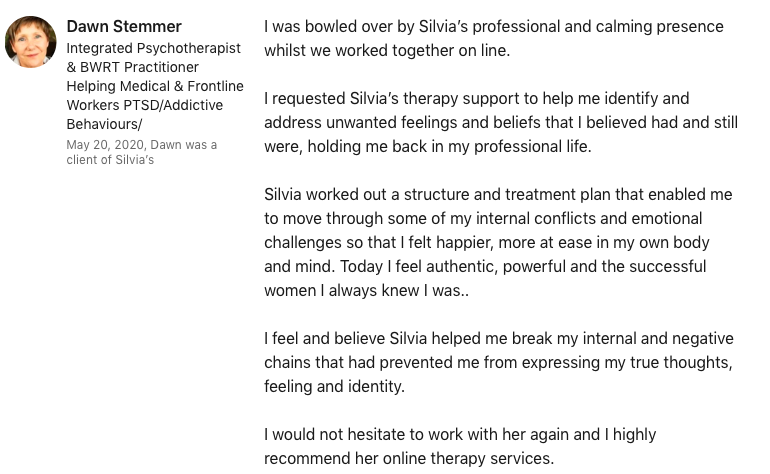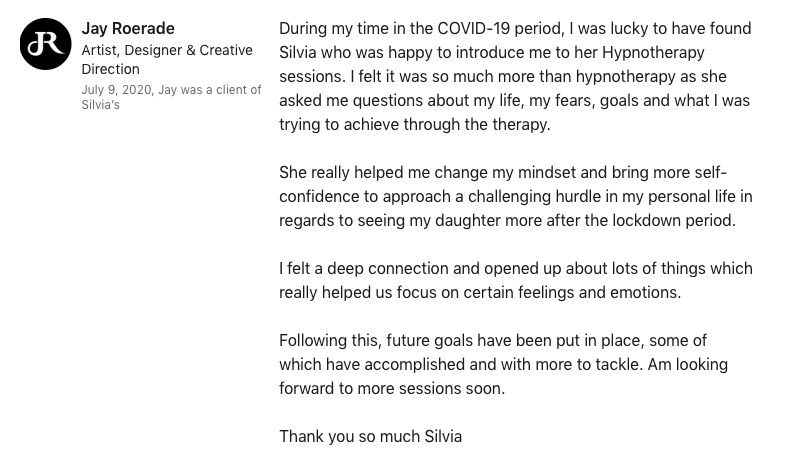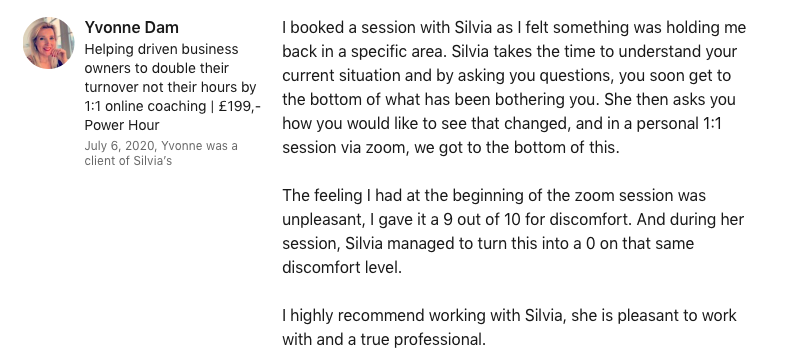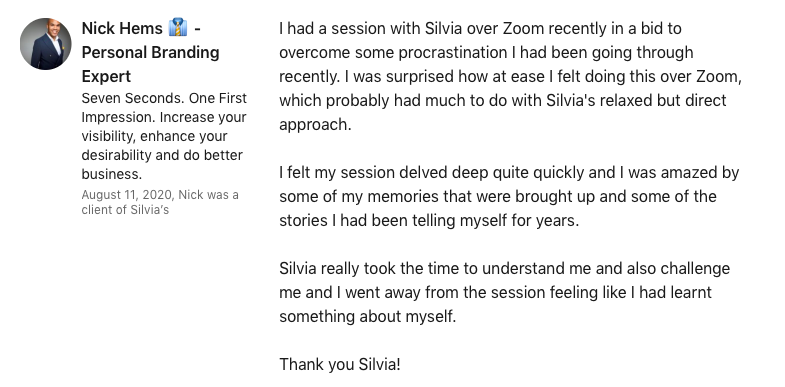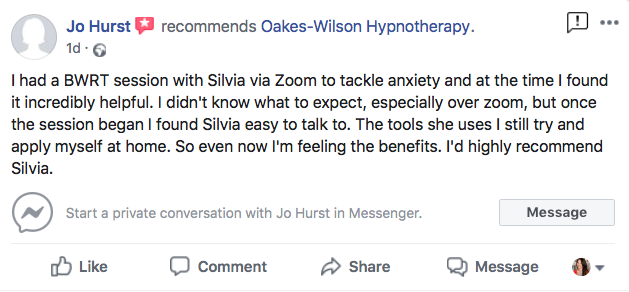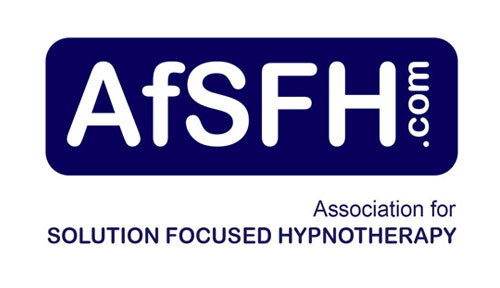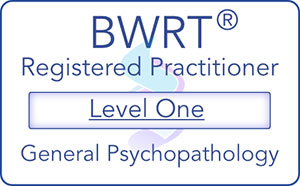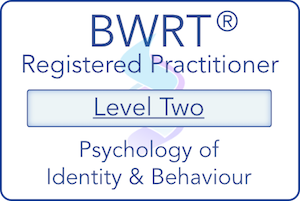
Clinical hypnotherapy and BWRT in Bristol
Bristol hypnotherapy and BWRT: Calm, confidence and wellbeing
Discover a safe, supportive space where you can transform patterns that no longer serve you, restore emotional balance, and move forward with clarity and confidence.
Hi, I’m Silvia and I’m here to help you create the change you deserve – quickly and effectively. I’m an Advanced BWRT practitioner and Clinical solution focused hypnotherapist with over 7 years of experience guiding clients to overcome challenges and achieve lasting transformation. Unlike traditional therapy, my approach is fast, solution-focused, and tailored to your unique needs.
Specializing in BrainWorking Recursive Therapy (BWRT), I use this cutting-edge, neuroscience-based method to help you reprogram your mind and break free from emotional or behavioral patterns that have been holding you back. Combined with the power of hypnotherapy, my sessions are designed to empower you with results that last.
What’s different about my approach?
1. Fast, effective results
BWRT and hypnotherapy don’t require months of sessions to start seeing results. You can experience profound changes after just a few sessions, allowing you to feel relief and improvement much sooner than you might expect.
2. No need to revisit painful past memories
The techniques I use work with your brain to process and change responses without revisiting the trauma directly. It’s a solution-focused therapy that helps you move forward without re-experiencing the pain.
3. Science-backed and cutting-edge
BWRT is grounded in the latest neuroscience and psychology, offering a scientifically validated approach to healing that’s practical, effective, and backed by evidence.
4. Personal and compassionate
Your journey is unique, and I’ll work with you every step of the way. As a certified BWRT practitioner and clinical solution focused hypnotherapist, I’m committed to providing a safe, empathetic environment for you to explore your challenges and achieve the transformation you deserve.
4. Tailored to you
Every session is designed specifically for your needs. We focus on understanding the root causes of your challenges, not just the symptoms.
5. Available online
Can’t make it to Bristol? No problem! I also offer online sessions, so you can benefit from this transformative therapy from the comfort of your home.
Want to know more?
Send me an email or book a complimentary consultation call – let’s talk about your goals, challenges, and how I can help you. I’ll answer any questions you may have, and together we’ll craft a plan to help you succeed.
Clinical hypnotherapy and BWRT in Bristol
Bristol hypnotherapy and BWRT: Calm, confidence and wellbeing
Discover a safe, supportive space where you can transform patterns that no longer serve you, restore emotional balance, and move forward with clarity and confidence.
Hi, I’m Silvia and I’m here to help you create the change you deserve – quickly and effectively. I’m an Advanced BWRT practitioner and Clinical solution focused hypnotherapist with over 7 years of experience guiding clients to overcome challenges and achieve lasting transformation. Unlike traditional therapy, my approach is fast, solution-focused, and tailored to your unique needs.
Specializing in BrainWorking Recursive Therapy (BWRT), I use this cutting-edge, neuroscience-based method to help you reprogram your mind and break free from emotional or behavioral patterns that have been holding you back. Combined with the power of hypnotherapy, my sessions are designed to empower you with results that last.
What’s different about my approach?
1. Fast, effective results
BWRT and hypnotherapy don’t require months of sessions to start seeing results. You can experience profound changes after just a few sessions, allowing you to feel relief and improvement much sooner than you might expect.
2. No need to revisit painful past memories
The techniques I use work with your brain to process and change responses without revisiting the trauma directly. It’s a solution-focused therapy that helps you move forward without re-experiencing the pain.
3. Science-backed and cutting-edge
BWRT is grounded in the latest neuroscience and psychology, offering a scientifically validated approach to healing that’s practical, effective, and backed by evidence.
4. Personal and compassionate
Your journey is unique, and I’ll work with you every step of the way. As a certified BWRT practitioner and clinical solution focused hypnotherapist, I’m committed to providing a safe, empathetic environment for you to explore your challenges and achieve the transformation you deserve.
4. Tailored to you
Every session is designed specifically for your needs. We focus on understanding the root causes of your challenges, not just the symptoms.
5. Available online
Can’t make it to Bristol? No problem! I also offer online sessions, so you can benefit from this transformative therapy from the comfort of your home.
Want to know more?
Send me an email or book a complimentary consultation call – let’s talk about your goals, challenges, and how I can help you. I’ll answer any questions you may have, and together we’ll craft a plan to help you succeed.
Client testimonials
How I can help you
Overcome anxiety and stress
If anxiety is controlling your life – whether it’s social anxiety, panic attacks, or general stress – I can help you break free. By reprogramming the brain’s response to stressful situations, you can regain control and start living with confidence.
Conquer phobias and fears
Whether it’s fear of flying, spiders, or even public speaking, BWRT and hypnotherapy can help eliminate phobias in as little as a couple of sessions. No more avoidance – just freedom.
Heal from past trauma
BWRT is highly effective in helping people break free from the lasting effects of trauma. It rewires how your brain responds to traumatic memories, allowing you to heal and move forward without being controlled by the past.
Stop unwanted habits
Struggling with procrastination, overeating, or other self-sabotaging behaviors? I can help you regain control by reprogramming your brain’s habitual responses and making lasting change easier than you ever thought possible.
Boost confidence and self-esteem
Are you ready to stop doubting yourself? BWRT and hypnotherapy can help uncover your full potential by removing limiting beliefs and enhancing your confidence and self-worth.
Manage anger in a healthy way
Anger can feel all-consuming, but it doesn’t have to control you. I can support you to reframe emotional triggers so you can respond with clarity and composure instead of frustration.
Break free from panic attacks
Panic attacks can feel overwhelming and unpredictable, but you can can learn how to rewire your brain’s response to triggers. Regain a sense of calm and control so you can live without fear.
Overcome sleep problems
Struggling with restless nights or trouble switching off? The techniques I use can calm your mind, reduce nighttime anxiety, and create healthier sleep patterns so you wake up feeling refreshed and ready for the day.
Release success inhibition
Do you feel stuck, unable to move forward despite wanting success? I can help you overcome subconscious blocks, allowing you to step into your full potential with confidence.
Navigate life changes with ease
Going through a major life transition? These moments can feel overwhelming and I’d love to support you to move forward with clarity and inner strength.
Recent blogs

